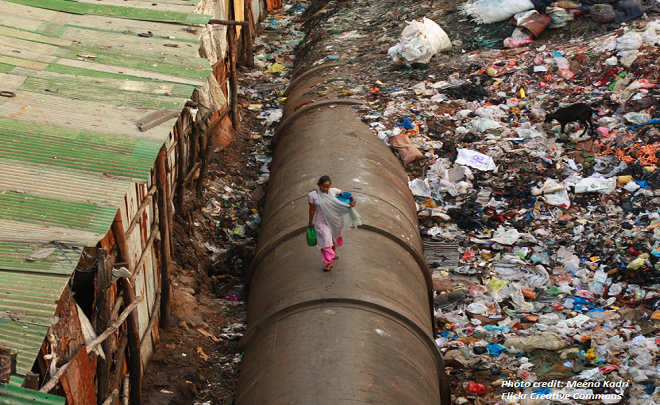Time to Rethink State-to-State Development Cooperation?

Jan Rudengren and Lars Rylander call for a paradigmatic shift in development cooperation strategies.
A mainstay in development cooperation still remains bilateral agreements signed between two states: the donor and recipient country. The rationale underpinning such is that the recipient country lacks the technical and financial resources to foster development, which the donor country can supply. However, increasing evidence has shown that such cooperation has frequently failed to result in poverty alleviation, democratic governance, or in protecting, not to mention strengthening, individuals’ economic and political rights.
Rather, all too often, the ruling elite of recipient countries have exploited state-to-state development assistance to remain in power and enrich themselves, thereby perpetuating clientelistic relations and the existence of extractive political and economic institutions. Accordingly, this calls into question the record of more than five decades of development assistance modality.
A Mixed Record
Many evaluations of development cooperation—including, for instance, Swedish co-operation with Sri Lanka, Vietnam, and Laos—prove that development assistance has had a positive impact in promoting health and educational development as well as poverty alleviation when the recipient government policy has been based on a genuine social and economic reform agenda.
On the other hand, state-to-state development cooperation has not contributed to a paradigm shift regarding consistency in establishing conditions for democracy and market economy. Indeed, examining the track record of such cooperation provides clear evidence that it has only marginally helped to reform corrupt state administrations, governance systems based on clientelism, and the political and economic monopolies of elites.
Moreover, these shortcomings have seldom been addressed, including by Sweden, when choosing which countries to establish bilateral development cooperation with. Rather, the most common argument for failures in these respects has been that the size of development assistance has been too limited to promote these types of effect. The political rhetoric in support of bilateral development cooperation has always emphasized that long-term development cooperation will eventually contribute to poverty alleviation, democratization, and the strengthening of human rights.
For the most part, therefore, the volumes and focus of assistance have remained unchanged—as has the “developmental deficit” in many recipient countries. As such, this calls into question the rationale underpinning much existing bilateral development cooperation and whether it is time for a new approach.
Conditions for Sustainable Development
In this regard, three major recent works (Robinson and Acemoğlu’s Why Nations Fail, Fukuyama’s Political Order and Political Decay, and Easterly’s The Tyranny of Experts) have contributed to advancing our understanding of the necessary conditions for sustainable development—but which have yet to prominently figure in international or Swedish discussions on development and development cooperation.
The upshot of this recent research shows that there needs to exist an independent legal system, effective state governance, and democratic control of parliament. In particular, a functioning rule of law is a necessary precursor to any democratic “breakthrough,” including a non-politicized government administration. Failure to meet these conditions negatively influences a country’s development trajectory.
Many countries that are targets of bilateral development cooperation suffer from weak capacity in all these areas as well as low levels of social and democratic capital. This heightens their vulnerability to clientelism, corruption, and inequality. Moreover, as much as capacity building is needed in these areas, simply providing top-down state driven assistance to democratically deficient countries does little to change the incentive to reform nor adequately impacts local livelihoods.
Empowering Civil Society and Harnessing Migration
The focus on state development at the expense of its citizens calls for a change of focus and a shift in paradigm towards a more individual rights approach: the individual should replace the state as the entry point for long-term assistance. Bypassing the recipient state apparatus means stronger involvement of civil society and the private sector. A positive example in this regard has been international support to institutions such as Grameen Bank and BRAC in Bangladesh, both of which provide microfinance and social services to the poor.
Such policy and strategic changes would involve an alternative approaches to poverty analysis regularly conducted by donors. Thus, rather than looking at government interventions, the searchlight needs to be directed at the constraints for individuals and civil society organizations so as to develop their potentials, from a rights perspective as well as improved livelihoods. The aim should be to provide a foundation for both political and economic rights and improved possibilities for the individual citizen to form his/her future and a better life.
Furthermore, a new strategy would recognize the important role of migration in poverty alleviation. Indeed, according to the World Bank, remittance volumes in 2013 were three times larger than official development assistance. Whether forced to flee from crisis or seeking new economic opportunities, people will continue to migrate to improve their lives. Meeting the needs of migrants such as by providing meaningful employment requires considerable rethinking, resources, and policy changes. The systems for sending home remittances also need to be reformed and made more secure. In so doing, harnessing migration as a positive force can contribute to improving the economic rights of the individual.
In conclusion, it is high time that new ways and means for achieving development and poverty alleviation are identified and formulated—ones which are in tune with the problems of the current globalized world, not as it looked half-a-century ago.
Dr. Jan Rudengren has more than 40 years of experience in international development in his capacity as Sida expert, staff member at the Asian Development Bank, researcher, and as a consultant.
Lars Rylander has worked for Sida, the Swedish Ministry of Foreign Trade, the International Labour Organization, and as an independent consultant.
Both are Associate Senior Fellows at ISDP.